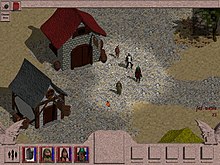A party is a group of characters adventuring together in a role-playing game.[1][2] In tabletop role-playing, a party is composed of a group of player characters, occasionally with the addition of non-player character allies controlled by those players or by the gamemaster.[2][3] In computer games, the relationship between the party and the players varies considerably. Online role-playing games parties often comprise player-controlled characters, as in tabletop games,[2][3] except that the non-player allies are always controlled to a lesser or greater extent by the computer AI.[1] In single-player computer games, the player generally controls all party members to a varying degree.[1][4]

Party role in gameplay
editResource management is a crucial part of role-playing games, and any player-controlled character, whether they can participate in combat or not, are always useful if they have the ability to carry heavy or bulky items. Non-player characters or alternative player-controlled characters used by the player with only this purpose in mind are called mules.[1][3] Usually, however, and exclusively in tabletop and single-player games, party members are valued for their tactical or story potential.[5][6]
References
edit- ^ a b c d Adams, Ernest (2010). Fundamentals of Game Design (2nd ed.). New Riders. pp. 492, 517. ISBN 978-0-321-64337-7. OCLC 460601644.
- ^ a b c Deterding, Sebastian; Zagal, José Pablo (2018). Role-Playing Game Studies: Transmedia Foundations. New York, NY: Routledge. pp. Box 2.3, Box 7.1. ISBN 978-1-315-63753-2. OCLC 1019729171.
- ^ a b c Tresca, Michael J. (2011). The Evolution of Fantasy Role-Playing Games. Jefferson, N.C.: McFarland & Co. pp. 159. 167, 188. ISBN 978-0-7864-6009-0. OCLC 697175248.
- ^ Altice, Nathan (May 2015). I Am Error: The Nintendo Family Computer / Entertainment System Platform. Cambridge, Massachusetts. pp. 212–214. ISBN 978-0-262-02877-6. OCLC 897401731.
{{cite book}}: CS1 maint: location missing publisher (link) - ^ Bowman, Sarah Lynne (2010). The Functions of Role-Playing Games: How Participants Create Community, Solve Problems and Explore Identity. Jefferson, N.C.: McFarland & Co. pp. 116–118. ISBN 978-0-7864-5555-3. OCLC 610030194.
- ^ Grayson, Nathan (May 11, 2018). "Picking An RPG Party Is Agony". Kotaku. Retrieved 2020-10-02.